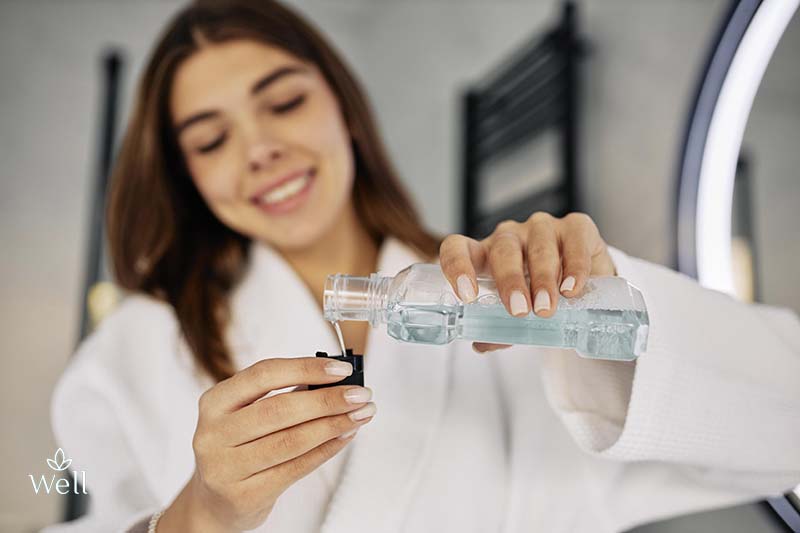Maintaining optimal oral hygiene is crucial, especially for adults over 45, who may experience gum disease and bad breath more frequently. The right mouthwash can significantly contribute to oral health, helping to combat these issues effectively. In this article, we will delve into the best mouthwash for gum disease and bad breath, focusing on their benefits, key ingredients, and how they can enhance your dental routine.

Understanding Gum Disease and Bad Breath
To tackle gum disease and bad breath, it’s essential first to understand their causes. Gum disease, or periodontal disease, arises due to the build-up of plaque—a sticky film of bacteria—on your teeth. If not managed, gum disease can lead to severe dental problems, including tooth loss.
Bad breath, medically termed halitosis, can stem from various factors, including poor oral hygiene, dry mouth, certain foods, and underlying health issues. A targeted mouthwash can help combat these problems directly.
Why Use Mouthwash for Gum Disease and Bad Breath?
Mouthwash serves multiple purposes in oral care:
- Reduces Plaque Build-Up: Many mouthwashes contain antibacterial ingredients that help reduce plaque and prevent gum disease.
- Freshens Breath: The right mouthwash can eliminate bad breath by neutralizing odor-causing bacteria.
- Enhances Cleanliness: Mouthwash reaches areas that brushing alone may miss, providing a more thorough clean.
- Promotes Gum Health: Certain mouthwashes are formulated to strengthen gums and reduce inflammation.
Key Ingredients to Look For
When searching for the best mouthwash for gum disease and bad breath, certain ingredients can enhance effectiveness:
- Chlorhexidine: A powerful antiseptic found in prescription mouthwashes, proven to combat gum disease effectively.
- Essential Oils: Mouthwashes containing eucalyptol, menthol, and thymol can help reduce plaque and freshen breath.
- Zinc Compounds: Effective in neutralizing bad breath odors by targeting the bacteria responsible.
- Fluoride: Helps to strengthen teeth and prevent decay, which can worsen gum disease.
- Aloe Vera: Known for its soothing properties, it can help alleviate gum inflammation.
The Best Mouthwashes for Gum Disease and Bad Breath
Here are some top-rated mouthwashes that are effective for managing gum disease and bad breath:

1. Listerine Total Care Anticavity Mouthwash
This mouthwash offers comprehensive protection against gum disease with its fluoride content, which strengthens tooth enamel. The essential oils formula provides antibacterial benefits while delivering a fresh mint flavor that combats bad breath.
2. ACT Anticavity Fluoride Rinse
Formulated to help prevent tooth decay, ACT includes fluoride to strengthen teeth. It’s alcohol-free, making it a gentle option for swollen gums while freshening breath.
3. Therabreath Fresh Breath Oral Rinse
This mouthwash is specifically designed to fight bad breath without the use of alcohol. With its unique formula containing zinc compounds, it neutralizes odors and addresses the root cause of halitosis.
4. Crest Pro-Health Advanced Mouthwash
Crest Pro-Health combines mouthwash with oral care benefits, providing protection against gum disease with its antibacterial properties. Its unique formulation helps to reduce plaque and gingivitis while freshening your breath.
5. Colgate Total Advanced Pro-Shield Mouthwash
This mouthwash provides long-lasting protection against plaque and gingivitis. It’s clinically proven to reduce bacteria on teeth and gums for up to 12 hours after rinsing, making it an excellent choice for adults over 45.
How to Use Mouthwash Effectively
For optimal results, follow these guidelines when using your mouthwash:

- Use Twice Daily: Incorporate mouthwash into your morning and evening routine for consistent benefits.
- Measure Correctly: Use the recommended amount, typically around 20ml (4 teaspoons), avoiding dilution with water.
- Swish Thoroughly: Swish the mouthwash around your mouth for the full time recommended on the bottle, usually around 30 seconds to 1 minute.
- Avoid Eating or Drinking: After rinsing, refrain from eating or drinking for at least 30 minutes to allow the active ingredients to work effectively.
Other Oral Care Tips for Combatting Gum Disease and Bad Breath
In addition to using mouthwash, consider these practices to enhance your oral health:
- Practice Regular Brushing: Brush your teeth at least twice a day with fluoride toothpaste to remove plaque build-up.
- Floss Daily: Flossing helps remove food particles and plaque between teeth where toothbrushes can’t reach.
- Stay Hydrated: Drinking water promotes saliva production, which is essential for neutralizing odor-causing bacteria.
- Limit Sugary Foods: Reducing sugar intake can help decrease plaque build-up and prevent gum disease.
- Visit Your Dentist Regularly: Routine check-ups and cleanings are essential for maintaining optimal oral health.
Potential Side Effects of Mouthwash
While mouthwash can offer substantial benefits, it’s essential to be aware of potential side effects:
- Dry Mouth: Some alcohol-based mouthwashes can lead to dry mouth, which may worsen bad breath.
- Oral Irritation: Some individuals may experience irritation or sensitivity due to certain ingredients.
- Staining: Mouthwashes that contain chlorhexidine may cause temporary staining of the teeth.
If you experience any adverse effects, consult with your dentist to discuss alternative options that may better suit your needs.
Incorporating Mouthwash into Your Daily Routine
Making mouthwash a part of your everyday oral care routine can yield significant benefits over time:
- Morning Routine: Start your day with mouthwash to eliminate morning breath and ensure a fresh start.
- Evening Routine: Use mouthwash before bed to help kill bacteria that have accumulated throughout the day.
- Post-Meal Rinse: Consider rinsing after meals, especially when consuming odor-causing foods, such as garlic or onions.
Final Thoughts on Choosing the Best Mouthwash
Choosing the best mouthwash for gum disease and bad breath involves evaluating various options based on your oral health needs. Always look for mouthwashes that contain active ingredients designed to target bacteria and inflammation. Reading reviews and consulting your dentist can also guide you toward the best product for your situation. Remember, maintaining good oral hygiene practices alongside using mouthwash is key to a healthy mouth.
By being proactive in your dental care and selecting the right mouthwash, you can significantly improve your oral health and enjoy fresher breath, helping you maintain confidence and well-being.
Benefits
Maintaining oral health is essential, and using the best mouthwash for gum disease and bad breath can greatly improve your overall dental hygiene. Below are five significant benefits of incorporating mouthwash into your daily routine, particularly if you are dealing with gum disease and persistent bad breath.
1. Reduces Plaque and Tartar Build-up
One of the primary benefits of using mouthwash designed for gum disease is its ability to reduce plaque and tartar build-up. Mouthwashes that contain antibacterial ingredients, such as chlorhexidine or cetylpyridinium chloride, can effectively target the bacteria that contribute to plaque formation. These active ingredients help in:
- Breaking down plaque: Mouthwash can penetrate hard-to-reach areas in your mouth, helping to dissolve plaque that regular brushing may miss.
- Preventing tartar formation: Regular use of an antibacterial mouthwash can inhibit the growth of bacteria, minimizing the chances of plaque hardening into tartar.
- Promoting healthier gums: By reducing plaque, mouthwash helps maintain gum health, thus preventing gum disease or worsening existing conditions.
2. Treats Gingivitis
Gingivitis is an early stage of gum disease characterized by inflammation, redness, and bleeding of the gums. The best mouthwash for gum disease typically contains ingredients that can effectively treat and prevent gingivitis. Here are some ways mouthwash helps:
- Reduces inflammation: Ingredients like essential oils and fluoride can help reduce gum inflammation, alleviating symptoms that accompany gingivitis.
- Encourages healing: Mouthwashes that promote healing can reduce the duration and severity of gingivitis symptoms, helping your gums return to a healthy state.
- Prevents recurrence: Using an antibacterial mouthwash regularly can prevent the development of gingivitis in the future by keeping bacterial levels in check.
3. Freshens Breath
Dealing with bad breath can be a source of embarrassment for many people. A high-quality mouthwash specifically designed for bad breath can greatly assist in freshening your breath effectively. This benefit includes:
- Masking odors: Mouthwash contains strong flavoring agents, like mint or citrus, that can help mask unpleasant odors in your mouth.
- Neutralizing bacteria: Many mouthwashes address the root cause of bad breath by killing the bacteria that produce foul-smelling compounds.
- Long-lasting effects: Unlike chewing gum, which only temporarily masks bad breath, a good mouthwash can provide longer-lasting freshness.
4. Enhances Overall Oral Hygiene
Integrating mouthwash into your dental care routine enhances your overall oral hygiene beyond tooth brushing and flossing. Here’s how mouthwash contributes to better oral health:
- Reaches inaccessible areas: Mouthwash can reach areas that toothbrushes and floss may not, ensuring a comprehensive cleaning experience.
- Reduces the risk of cavities: Some mouthwashes contain fluoride, which helps strengthen teeth and provides additional protection against cavities.
- Supports a balanced oral microbiome: A well-formulated mouthwash helps maintain a healthy balance of bacteria, ensuring beneficial bacteria thrive while harmful bacteria are kept in check.
5. Promotes Overall Health
Oral health is closely linked to overall health, and using the best mouthwash can have benefits that extend beyond your mouth. Here’s how:
- Reduces inflammation: Poor oral health is often correlated with systemic conditions like heart disease and diabetes. Using a mouthwash designed for gum disease can reduce inflammation in the mouth, potentially lowering the risk of these conditions.
- Improves quality of life: Good oral hygiene can boost confidence and comfort, allowing individuals to eat, speak, and socialize without concern for bad breath or gum issues.
- Encourages regular dental visits: Maintaining good oral hygiene habits, including the use of mouthwash, encourages individuals to take their dental care seriously, which can promote routine visits to your dentist.
Related Links
FAQ – Questions and Answers
What causes gum disease and how can mouthwash help?
Gum disease is caused by plaque buildup on the teeth, which leads to inflammation and infection. Mouthwash helps by killing bacteria and reducing plaque, preventing the progression of gum disease.
Can mouthwash cure bad breath permanently?
Mouthwash can control and reduce bad breath by eliminating odor-causing bacteria, but permanent results require consistent oral hygiene and addressing underlying causes.
What ingredients should I look for in a mouthwash for gum disease?
Key ingredients include chlorhexidine, essential oils (like eucalyptol and thymol), fluoride, aloe vera, and zinc compounds for antibacterial and anti-inflammatory effects.
Is alcohol-free mouthwash better for sensitive gums?
Yes, alcohol-free mouthwashes are gentler and reduce the risk of irritation, making them ideal for people with sensitive or inflamed gums.
For best results, use mouthwash twice daily—once in the morning and once at night—after brushing and flossing.
Can mouthwash replace brushing and flossing?
No, mouthwash is a supplement to brushing and flossing, not a replacement. It helps reach areas your toothbrush may miss.
What is chlorhexidine and why is it effective?
Chlorhexidine is a prescription antiseptic that kills bacteria and helps treat gum disease. It's highly effective but may cause temporary tooth staining.
Which mouthwash is best for both gum disease and bad breath?
Listerine Total Care and Therabreath Fresh Breath Oral Rinse are top choices as they target bacteria while freshening breath.
Does mouthwash prevent plaque build-up?
Yes, many mouthwashes contain antibacterial agents that help prevent plaque formation, reducing the risk of gum disease.
Can fluoride mouthwash help with gum health?
Fluoride strengthens enamel, which supports overall oral health and helps protect against conditions that worsen gum disease.
What’s the difference between cosmetic and therapeutic mouthwash?
Cosmetic mouthwashes only mask bad breath, while therapeutic ones contain active ingredients that address oral health issues like gingivitis and plaque.
Are natural mouthwashes effective for gum disease?
Natural mouthwashes with essential oils and aloe vera can reduce inflammation and bacteria, but may be less potent than clinical formulations.
How long should I swish mouthwash in my mouth?
You should swish mouthwash for at least 30 seconds to allow the ingredients to effectively target bacteria and freshen breath.
Can mouthwash help treat gingivitis?
Yes, mouthwashes with antibacterial and anti-inflammatory ingredients are effective in reducing symptoms and preventing progression of gingivitis.
What are the potential side effects of using mouthwash?
Possible side effects include dry mouth, tooth staining (especially with chlorhexidine), and irritation from strong formulas.
Is it safe to use mouthwash every day?
Yes, daily use is safe for most people, especially with alcohol-free, fluoride, or natural formulations designed for long-term use.
Can I use mouthwash after brushing my teeth?
Yes, using mouthwash after brushing enhances cleaning by reaching areas your toothbrush and floss may miss.
Should I rinse with water after using mouthwash?
No, rinsing with water can dilute the active ingredients. It’s best to avoid eating or drinking for 30 minutes after use.
Does bad breath always mean poor hygiene?
Not always. Bad breath can also be caused by dry mouth, diet, or underlying health conditions like sinus infections or diabetes.
Can mouthwash help with dry mouth?
Some mouthwashes are formulated specifically for dry mouth, providing moisture and reducing bad breath associated with it.
Is Therabreath good for halitosis?
Yes, Therabreath is designed to combat halitosis with its oxygenating and zinc-based formula, neutralizing odor-causing bacteria.
How do essential oils in mouthwash work?
Essential oils like thymol and eucalyptol disrupt bacterial cell walls, reducing plaque and inflammation while providing a fresh scent.
What’s the best time to use mouthwash?
Morning and night are ideal times—after brushing—to ensure lasting protection and freshness throughout the day and night.
Does ACT Fluoride Rinse help with gum inflammation?
Yes, ACT is gentle and fluoride-rich, helping to protect enamel and soothe gums, especially for those with mild irritation.
Why is bad breath worse in the morning?
Overnight, saliva production slows down, allowing bacteria to grow unchecked. Using mouthwash before bed can help reduce this.
Can mouthwash prevent tooth decay?
Mouthwash with fluoride can help strengthen enamel, reducing the risk of tooth decay and supporting overall oral health.
What’s the role of zinc in mouthwash?
Zinc neutralizes sulfur compounds that cause bad breath, making it an effective ingredient in combating halitosis.
Is Crest Pro-Health a good option for gum care?
Yes, it offers antibacterial protection, reduces plaque, and promotes gum health without the burn of alcohol-based products.
Can children use mouthwash for gum health?
Mouthwash use in children should be supervised, and only alcohol-free, fluoride-based options should be used after age 6.
How can I choose the right mouthwash for my needs?
Consider your specific concerns—plaque, sensitivity, breath—and look for mouthwashes with clinically proven ingredients tailored to those needs.
Interesting Links
Social Media
Instagram: https://www.instagram.com/newofficialwellness/
Facebook: https://www.facebook.com/people/Well-Health-Guide
Youtube: https://www.youtube.com/officialwellness

